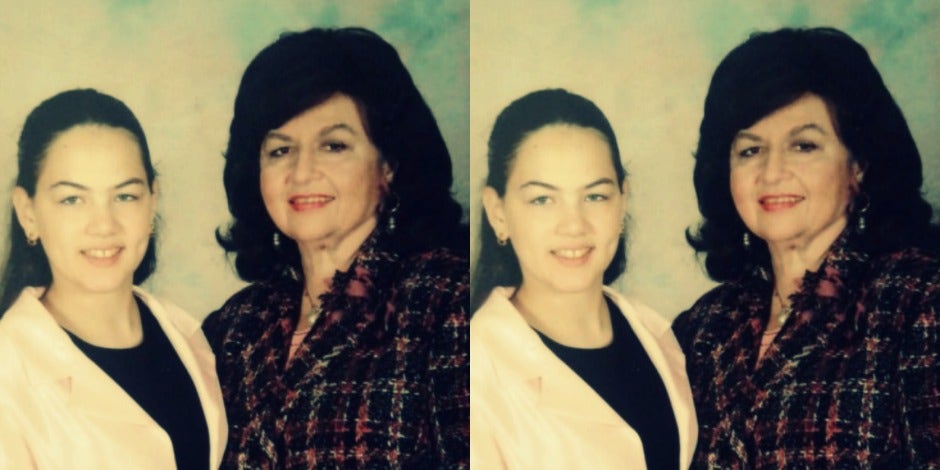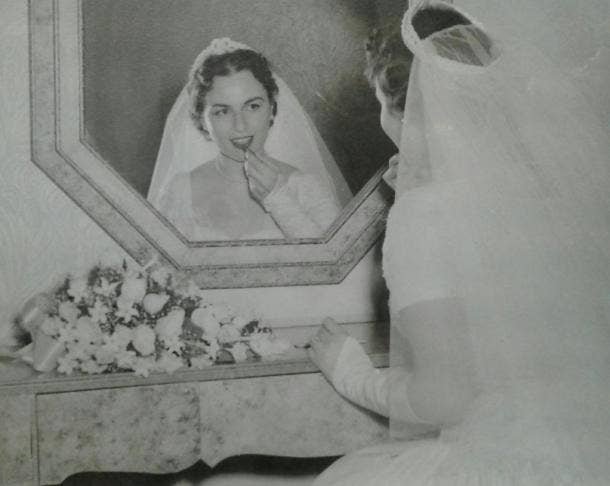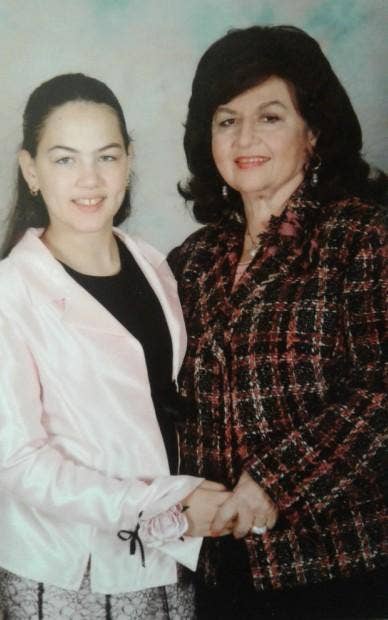
At least, this is what it felt like to me.
By Estee Kahn — Written on Sep 12, 2017
Photo: the author

On September 9th, we got a call at 2:30 in the morning.
The moment the caller ID called out my aunt's name, we knew: my grandmother, Sandra Kahn, had passed away.

At that moment everything changed, as I felt myself start to experience the various stages of grief, right then and there.
1. Shock
No matter how much you're expecting it, you are never prepared when the loss finally comes.
My grandmother had been suffering from dementia for years and a few weeks ago had stopped eating, having lost the ability. Once someone stops eating...it can only be a matter of time.
But she kept holding on.
For three weeks or so we were still able to visit her. And I guess a part of me thought, even though I knew it was impossible, she'd somehow manage to find a way to keep pulling through. Which I knew was crazy but when she'd lasted this long ... you always hope.
So when we heard the news — I couldn't quite believe it. It was so surreal. Even as we talked about it...it was like my brain couldn't accept it as reality.
2. Guilt
The last time I saw the grandmother I knew was before I left for a year abroad at my brother's Bar-mitzvah, which was over the Sabbath. I left that following Monday.
I came home to a grandmother who barely recognized me as family and would talk about things that made no sense.
And while I'm sure my last real words to my grandmother were "goodbye" and "love you", I was a teenager. It never occurred to me to ask her to tell me all the stories and words of wisdom she possessed. I never realized how final my goodbye would be.
So now, faced with the loss — with the most final loss — it all hit me again how many of those wasted moments I'd missed.
3. Sadness
Then I felt sadness in the I-feel-sad-that-she's-gone kind of way. I shed a few tears, but not the tear-your-heart-out way that would come later. Because it was still so abstract and unreal.
You cry because you know you're supposed to, because your body elicits the normal reaction. But your heart hasn't processed the news or accepted it as reality so the tears slid out and quickly ended.
4. Denial
As we cleaned my house for the coming week of Shiva on Saturday night, I didn't quite accept it. As I put on my waterproof mascara and got dressed in all black, I couldn't believe it. As we drove to the cemetery, it didn't seem real.
Even as I greeted members of our community and family friends who had come out for the funeral as we waited in the funeral procession — even as I said, "I'm OK" and, "She's in a better place" when they all asked how I was doing — I couldn't quite believe it.
And then, as the funeral started, as I watched the bearers bring her coffin from the hearse to lay beside my grandfather's grave, it suddenly became real.
5. Heartbreak
I listened as our Rabbi talked about my grandmother and the wonderful woman that she was, including stories I'd never heard before.
But it was when I heard the voices of my aunt, cousins and father break, that my heart was torn in a million different directions while being trampled by a herd of elephants — all at once.
Now the tears came in unending droves.
I would never hear her voice sassing my father or sister again. I would never get to show her how I'd grown to love the arts almost as much as she did. She'd never get to see all the things I'd drawn and painted since she's first taught me how to draw or swap some good book recommendations with her.
My grandmother would never know that I was going into the English field so I can be involved in books and writing, having inherited her love of both.
She was gone. And there was nothing I could do to change it, to bring her back or take away the pain her children and grandchildren felt.
And it crushed me.

6. Acceptance
I think we can only begin to accept once we've reached empty, or close enough to it: kind of like how we don't recharge our electronics or refuel a car unless they're practically empty.
Slowly, with each additional "I'm OK", I slowly became more OK — or as OK as you can get.
I could now see the good in that she passed in her sleep, what most people pray for, and that she was finally reunited with my grandfather in a better place.
And while her loss still hurt, it became a little more bearable.
7. Remembrance
Related Stories From YourTango:
The first things you remember are always the most recent and often, and those are the most heartbreaking. It's the memories of weakness or pain or their inability to remember who you are.
But slowly, the good memories come.
We reminisce about her playing Slingo on our computer and letting me play on her account since I wasn't old enough to make an account of my own. I remembered how she taught me to always flip to read the jacket of a book and then flip to a random page so you can see if you like the author's style. I remember seeing Batman: The Dark Knight with my friend and her tagging along with us.
Slowly, the little things come rushing to our memories — the things you don't even remember remembering — and slowly, you can begin to smile.
8. Healing
As all of my aunts, uncles, and cousins came back to my house to start the first day of Shiva, we felt some normalcy return. My father and his next closest sister began to "fight" like they always do.
We traded stories of how she would go to every grandchild's recital or host anything and everything for an excuse to bring everyone together.
How she taught all of us the beauty in everything — in life! — through art, music, theater, and nature.
And while it is still painful and will probably never fully heal, I could feel us as a whole, as a family, begin to heal.
And I know she would be proud.
Estee Kahn is a dreamer and a romantic who writes all about love — dating, relationships, friendships, yourself, and family. You can follow her on Instagram or Twitter (@esteekahn).
